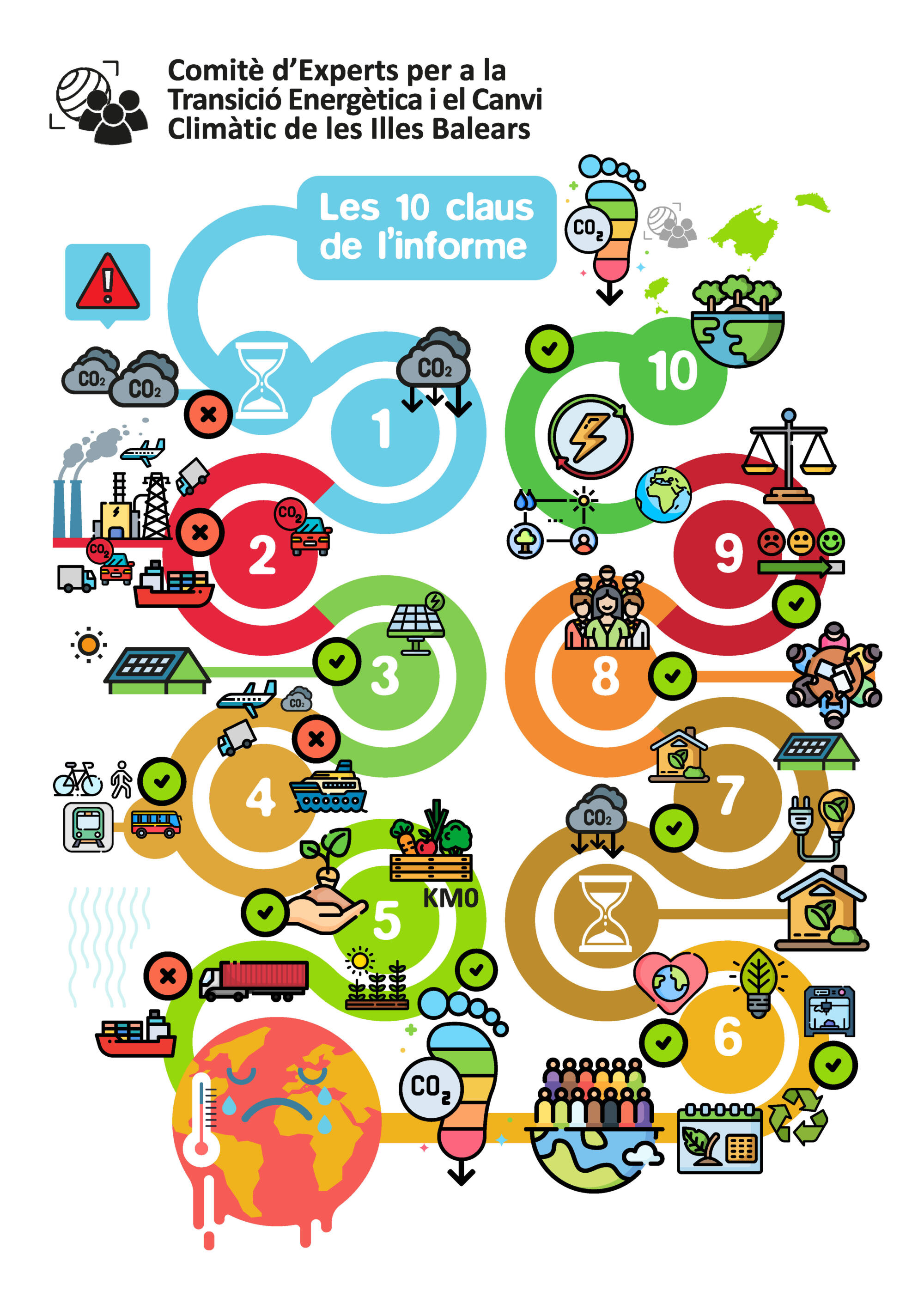
News
19 September 2022
CLIMATE CHANGE AND THE BALEARIC ISLANDS
Last Tuesday 13th September the Committee of Experts for Energy Transition and Climate Change presented the first annual report. It highlights the following impacts:
“The maximum and minimum temperatures in the Balearic Islands have already increased by 0.44°C and 0.37°C per decade between 1975 and 2015, and the sea temperature has also increased. At the current rate of emissions, by the end of the century the temperature could rise by 3°C to 5°C”.
In addition, heat waves will become more frequent, more intense and longer lasting. Sea level has risen by 1.3 cm per decade on average in the 20th century, but this rise is increasing, with a current trend of 3 cm per decade. Depending on emission trends from now on, sea level in the Mediterranean could rise by 37 to 90 cm by the end of the century. This will undeniably affect our coastline, especially beach areas, which may be substantially reduced. In addition, rainfall is expected to be reduced by 10-20%, but the effect on water availability will be aggravated by increased evapotranspiration due to higher temperatures.

- If we continue at the linear rate of emission reductions observed since 2009, the targets will not be achieved by 2030 or 2050. We must therefore accelerate the energy transition and emissions reductions, as well as work on adaptation strategies. The time to act is now!
- The main greenhouse gas emitting sectors in the Balearic Islands are energy generation and transport. Together, they generate more than 80% of our emissions. It is therefore essential to focus efforts on these sectors.
- Renewable energy generated in the Balearic Islands only slightly exceeds 1.5%. The energy transition in energy generation implies a significant deployment of renewable energies, which in any case would occupy little more than 1% of the territory. However, it is essential that this deployment is done in an orderly and rational manner, with maximum care for land use, ecosystems and cultural heritage, prioritising existing roofs and encouraging citizen involvement and self-consumption. To achieve the target set for 2030, around 600 Mw would have to be installed each year.
- The sector that consumes the most energy and generates the most emissions is transport (land, air and sea). It is therefore essential to tackle a transformation of land mobility that goes beyond technological or fuel changes and requires an ambitious plan in favour of public transport, walking, cycling and personal mobility vehicles (PMVs). Equally important is to address maritime and air transport, which are closely linked to the island’s economic model, largely focused on tourism. In this regard, not only is it necessary to urgently consider technological substitution so that the means of transport to the islands generate zero or almost zero emissions, but also to reduce the flow of visitors, who also generate a large volume of emissions during their stays (internal travel, consumption of resources that have to be imported, waste generation, energy consumption, etc.).
- The import of industrially produced and agro-toxic foodstuffs generates emissions, waste, pollution and waste in all links of the chain. The Balearic Islands have many factors that would allow the development of a socially and economically sustainable and environmentally regenerative agro-livestock farming, improving food security and sovereignty, mitigation and adaptation to climate change and the local circular economy.
- Addressing the climate emergency in the Balearic Islands in a rational way necessarily implies addressing the change of model, which requires the development of other sectors not linked to tourism activity: sustainable and regenerative agriculture and livestock farming, manufacturing linked to the recovery of materials and zero waste, the third sector and the integration of vulnerable people, people’s care, research and innovation, etc.
- The limited availability of time and resources makes it necessary to identify the best measures to take, which must be those that best respond to the needs of the islands and their citizens, to their physical and natural reality, and which are efficient in terms of both the use of resources and the reduction of emissions. In this sense, the electrification of transport and of many energy uses in homes, powered by renewable energies, is a much more appropriate response than the deployment of hydrogen, which is very inefficient and should be focused only on those limited uses in which it can make sense in the Balearic Islands, such as maritime transport or brick manufacturing.
- The depth of the transition to be achieved makes it important to create governance frameworks that involve citizens in defining these changes and the measures to be taken. Citizen Climate Assemblies can be useful tools in this regard.
- An effective energy transition necessarily involves reducing inequalities and paying special attention to the most vulnerable people in our society. Given the need for resources to tackle the transition, it is important that those people (natural and legal) who have the most, contribute in a consistent manner to make this transition possible and accelerate it and generate opportunities for those in vulnerable situations.
- The energy transition needed to tackle climate change represents an opportunity to build a more resilient Balearic Islands, with greater well-being, with citizens who are better protected against climate, economic and health risks, healthier citizens, a more protected natural environment, a diversified economy based on greater education and training of people, as well as less dependence on the outside world (both in terms of fuels and basic necessities).
- Source
http://www.caib.es/sites/canviclimatic2/ca/comita_de_expertos/
Esta web utiliza cookies para analítica digital, mejorar su experiencia de usuario y personalización de publicidad. Puede consultar nuestra política de cookies aquí.
